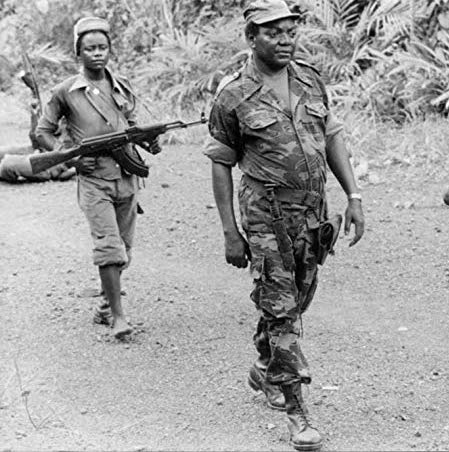|
FLEC
The Front for the Liberation of the Enclave of Cabinda ( pt, Frente para a Libertação do Enclave de Cabinda, FLEC) is a guerrilla and political movement fighting for the independence of the Angolan province of Cabinda.AlʻAmin Mazrui, Ali. ''The Warrior Tradition in Modern Africa'', 1977. Page 227. Formerly under Portuguese administration, with the independence of Angola from Portugal in 1975, the territory became an exclave province of the newly independent Angola. The FLEC fights the Cabinda War in the region occupied by the former kingdoms of Kakongo, Loango and N'Goyo. History On February 1, 1885, the Treaty of Simulambuco was signed, establishing Cabinda as a Portuguese protectorate. A monument was built by colonial authorities in 1956 at exact place where treaty was signed in 1885, 5 km north of Cabinda city. In 1963, three organizations — the Movement for the Liberation of the Enclave of Cabinda (MLEC), Action Committee of the Cabinda National Union (CAUNC), a ... [...More Info...] [...Related Items...] OR: [Wikipedia] [Google] [Baidu] |
Cabinda War
The Cabinda War is an ongoing separatist insurgency, waged by the Front for the Liberation of the Enclave of Cabinda (FLEC) against the government of Angola. FLEC aims at the restoration of the self-proclaimed Republic of Cabinda, located within the borders of the Cabinda province of Angola. Background The first Western exploration of the area of modern-day Cabinda was undertaken by navigator Diogo Cão in 1483, later falling under Portuguese influence. In 1853 a delegation of Cabindan chiefs unsuccessfully requested the extension of Portuguese administration from the colony of Angola to Cabinda. Local chiefs continued their attempts at cooperating with Portugal until the 1884 Berlin Conference and the 1885 Treaty of Simulambuco, following which the Cabindan enclave became a Portuguese protectorate. Despite the fact that Cabinda held a semi independent status, a new Portuguese government elected in 1956 transferred the region's administration to Angola without a prior agreement ... [...More Info...] [...Related Items...] OR: [Wikipedia] [Google] [Baidu] |
Republic Of Cabinda
The Republic of Cabinda (Ibinda: ''Kilansi kia cabinda''; pt, República de Cabinda) was an unrecognized state located in what is presently Angola's Cabinda Province. The Front for the Liberation of the State of Cabinda- Exército de Cabinda (FLEC) claims sovereignty from Angola and proclaimed the Republic of Cabinda as an independent country in 1975. The government of this (internationally unrecognized) entity operates in exile, with offices located in Paris, France, and Pointe Noire, Congo-Brazzaville. The 1885 Treaty of Simulambuco designated Cabinda a Portuguese protectorate known as the Portuguese Congo, which was administratively separate from Portuguese West Africa (Angola). In the 20th century, Portugal integrated Cabinda as a district within the "overseas province" of Angola. During the Portuguese Colonial War, FLEC fought for the independence of Cabinda from the Portuguese. Independence was proclaimed on 1 August 1975, and FLEC formed a provisional government led ... [...More Info...] [...Related Items...] OR: [Wikipedia] [Google] [Baidu] |
Cabinda (province)
Cabinda (formerly called Portuguese Congo, kg, Kabinda) is an exclave and province of Angola in Africa, a status that has been disputed by several political organizations in the territory. The capital city is also called Cabinda, known locally as ''Tchiowa'', ''Tsiowa'' or ''Kiowa''. The province is divided into four municipalities—Belize, Buco-Zau, Cabinda and Cacongo. Modern Cabinda is the result of a fusion of three kingdoms: N'Goyo, Loango and Kakongo. It has an area of and a population of 716,076 at the 2014 census; the latest official estimate (as at mid 2019) is 824,143. According to 1988 United States government statistics, the total population of the province was 147,200, with a near even split between rural and urban populations. At one point an estimated one third of Cabindans were refugees living in the Democratic Republic of the Congo; however, after the 2007 peace agreement, refugees started returning to their homes. Cabinda is separated from the rest ... [...More Info...] [...Related Items...] OR: [Wikipedia] [Google] [Baidu] |
Henrique N'zita Tiago
Henrique N'zita Tiago (14 July 1927 – 3 June 2016) was President of the Armed Forces of Cabinda, a rebel group that fights for the independence of Cabinda from Angola. He died in Paris on 3 June 2016. It was reported that Tiago was 88 years old when he died, and that he was buried in France – as Cabinda was not independent at the time of his death. Biography He was born on July 14, 1927, at the mission of San Jose de Luali in the region of Dinge, or in Mboma Lubinda, Cabinda, into a modest family. In 1963, he co-founded the Front for the Liberation of the Enclave of Cabinda (FLEC) to fight against Portuguese colonial rule. Because he was part of the FLEC, he was arrested in 1970 by the colonial PIDE. He served his sentence in the São Nicolau jail in Bentiaba. He was released in 1974, opened a FLEC office in Tchiowa, the capital of Cabinda; and a year later, he was appointed chairman of the FLEC. Upon learning that the Portuguese government was planning to include Cabin ... [...More Info...] [...Related Items...] OR: [Wikipedia] [Google] [Baidu] |
Angola
, national_anthem = " Angola Avante"() , image_map = , map_caption = , capital = Luanda , religion = , religion_year = 2020 , religion_ref = , coordinates = , largest_city = capital , official_languages = Portuguese , languages2_type = National languages , languages2 = , ethnic_groups = , ethnic_groups_ref = , ethnic_groups_year = 2000 , demonym = , government_type = Unitary dominant-party presidential republic , leader_title1 = President , leader_name1 = João Lourenço , leader_title2 = Vice President , leader_name2 = Esperança da CostaInvestidura do Pr ... [...More Info...] [...Related Items...] OR: [Wikipedia] [Google] [Baidu] |


